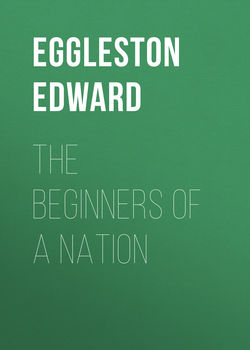Читать книгу The Beginners of a Nation - Eggleston Edward - Страница 26
BOOK I.
RISE OF THE FIRST ENGLISH COLONY
CHAPTER THE SECOND.
JAMES RIVER EXPERIMENTS
XVI
ОглавлениеDivision of land. Not only did this admirable charter establish a representative form of government and do away with martial law, but it fairly launched the Virginians on the current of freedom and advancement by authorizing a liberal division of land to all those who had arrived before the departure of Sir Thomas Dale. 23 The oldest land titles in Virginia are deduced from the authority of the Great Charter of 1618. Aspinwall Papers, p. 14, note. Communism, pernicious everywhere, is at its worst in an infant settlement. True Declaration, p. 25. "Every man sharked for his own bootie," says a writer on Virginia in 1609, "but was altogether careless of the succeeding penurie." The distribution of land abolished the common stock system of labor, and opened a pathway to the ambition of the diligent.
The good news in Virginia. Tidings of the great change wrought in their condition and prospects by the new charter reached the dwellers on the James River in the spring of 1619, and the colonists were "ravished with so much joy" that they felt themselves "now fully satisfied for their long labors and as happy men as there were in the world." Note 17. They valued their liberties as no man can who has not known the bitterness of bondage, and in 1623, when they had reason to fear the re-establishment of the old tyranny, the Virginia Assembly petitioned the king in these strong words: "Rather than be reduced to live under the like government, we desire his Majesty that commissioners may be sent over to hang us." Tragicall Relation, 1623. We have here, perhaps, the very first of the many protests of colonial Legislatures against oppression from England.
23
The Code of Lawes, Divine, Morall and Martiall, by which Dale reigned was edited and published by Strachey in 1612, and reprinted in Force's Tracts, vol. iii. This code appears to have had no other sanction than the approval of Sir Thomas Smythe, the governor of the company. The beneficial effect of these laws is maintained in Hamor's Discourse, in Rolfe's Relation, and in certain letters of Dale in the Record Office. It was not, indeed, the government by martial law, but Dale's abuse of his power, that wrought the mischief. After the emancipation the old settlers lived in perpetual terror lest some turn of the wheel should put them once more in the power of Sir Thomas Smythe and his divine and martial laws. See especially the Additional Statement appended to the Discourse of the Old Virginia Company. On the long and bitter dissension that resulted in the overthrow of the company, see Arthur Woodnoth's Short Collection of the most remarkable Passages from the Original to the Dissolution of the Virginia Company, a rare work of great value to the historian of this period.
Note 17, page 56. Rolfe's Relation has it that the ship which brought Yeardley brought also the news of the election of Sandys and John Ferrar. But Yeardley arrived in Virginia on the 18th of April (O.S.), and Sir Thomas Smythe's resignation did not take place until ten days later. Manuscript Records of the Virginia Company. The news that Sir George Yeardley did bring was no doubt that the power of Sir Thomas Smythe and his party was broken, and that the actual control of affairs was in the hands of such men as Sandys, Southampton, Cavendish, Danvers, and the two Ferrars. The whole policy of the company indicates that the new party was really in power, and the appointment of such a man as Yeardley was probably the work of the rising party. The records before the resignation of Sir Thomas Smythe were probably destroyed for purposes of concealment.
